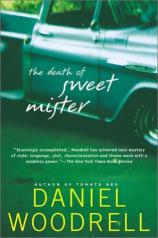The Death of Sweet Mister
Review
The Death of Sweet Mister
Woodrell's writing invokes the hallowed names of previous masters, from Faulkner to James M. Cain, but he sounds like no one else. He combines the tough, quick-firing prose of classic hard-boiled crime fiction with lyrical beauty and a certain sense of romance: "The sun turned away like it was laughing at her. Sunset shoved her hope downhill," he writes, and the despair is palpable.
There's more than a little despair in SWEET MISTER, though it's full of grim humor, too. Woodrell's narrator, a 13-year-old mama's boy called Shug, speaks in quaint, archaic prose that pushes the whole book into some lost realm beyond the reach or relevance of time. But despite his almost biblical way of speaking, Shug describes unflinchingly and in precise detail the reality that surrounds him, sometimes beautiful and frequently horrific.
Shug lives with his mother Glenda in a house at the center of a cemetery; his mother is the graveyard's caretaker, though he does most of the actual work. "I believe dusks and dawns spent staring out that window shaded me ever more towards no-good and lonely," Shug observes. Glenda is a young, raven-haired woman given to drinking "tea" (her euphemism for rum and coke) all day long from a silver thermos. Her sultry beauty strikes fire into the hearts of all men; Shug himself is not immune. He observes her good looks in the same strange tones he uses to describe everything else, with obvious pride, a hint of reproach, and maybe something more mixed in: "She wore shorts that were not too motherly. They fit on her mighty scenic...She moved about real peppy, all limber and wiggly, that way of moving called sashay."
Even more inflammatory than Glenda is her husband Red, an oft-convicted maniac who, when he isn't off "scallybippin" with his buddy Basil or too drunk and high to see straight, likes to knock the stuffing out of Glenda and Shug. "His attitude stayed at simmer or scorch on all subjects that I know of but olden rhyming rock 'n roll," says Shug. "He carried young love for that music and some sort of crashed but still moving wrecked love for Glenda, but that was it that I know about."
Red despises the pudgy, cautious boy --- "He had a variety of ugly tones to speak in and used them all at me on most days" --- but he needs Shug to break into sick people's houses and steal their prescription drugs for him and Basil. If the take's not as big as Red had hoped, Shug gets a beating.
Into this cauldron of love, hate, thefts, and grievances, Woodrell brings an upstanding gent called Jimmy Vin in a pristine Thunderbird. Jimmy Vin has a job and money and a taste for fine food. When he takes a shine to Glenda, things boil over completely, in ways both predictable and unforeseen.
Eventually, the sense of dread that pervades the novel culminates in a terrible scene that is simultaneously creepy and profoundly sad. It's an awful tale of evil and despair, but so gorgeously rendered that it breaks your heart in two ways at once.
Reviewed by Becky Ohlsen on January 21, 2011
The Death of Sweet Mister
- Publication Date: July 30, 2002
- Genres: Fiction
- Paperback: 208 pages
- Publisher: Plume
- ISBN-10: 0452283302
- ISBN-13: 9780452283305




